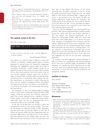
Hair loss causes emotional distress, leading to high spending on treatments, with Minoxidil and Propecia being common but having side effects.
 April 2016 in “British Journal of Dermatology”
April 2016 in “British Journal of Dermatology” Eyelashes are important for looks and eye protection, and more people are treating sparse eyelashes; more research is needed to understand eyelash biology and improve treatments.
 April 2016 in “Plastic and reconstructive surgery. Global open”
April 2016 in “Plastic and reconstructive surgery. Global open” The supplement highlighted advancements and challenges in plastic and reconstructive surgery, including the impact of smoking, chemotherapy, and new treatments like Tafluprost for hair loss.
 January 2012 in “Postgraduate obstetrics & gynecology”
January 2012 in “Postgraduate obstetrics & gynecology” Up to half of women by age 50 experience significant hair loss, with various types and treatments available.
 April 2011 in “Global journal of health science”
April 2011 in “Global journal of health science” Aldactone effectively reduces hair thickness in women with excessive hair growth, both alone and with other treatments.
 May 2009 in “Medical and surgical dermatology/Medical & surgical dermatology”
May 2009 in “Medical and surgical dermatology/Medical & surgical dermatology” Hair and nail conditions can stabilize or improve over time, and new treatments show promise.
 June 2008 in “Springer eBooks”
June 2008 in “Springer eBooks” The document concludes that permanent hair loss conditions are complex, require early specific treatments, and "secondary permanent alopecias" might be a more accurate term than "secondary cicatricial alopecia."
 August 2007 in “Journal of Investigative Dermatology”
August 2007 in “Journal of Investigative Dermatology” The meeting discussed vitamin D3's role in fighting tuberculosis, potential treatments for skin conditions like psoriasis, and hair follicle regeneration as a possible solution for hair loss.
 June 2007 in “Men in Nursing”
June 2007 in “Men in Nursing” The document emphasizes early detection and treatment of men's skin conditions and recommends protective measures and appropriate treatments for different age groups.
 June 1995 in “International Journal of Gynecology & Obstetrics”
June 1995 in “International Journal of Gynecology & Obstetrics” Hysteroscopic surgery is better than hysterectomy for treating dysfunctional uterine bleeding due to fewer complications and quicker recovery, with high satisfaction in both treatments.
 January 1993 in “Side effects of drugs annual”
January 1993 in “Side effects of drugs annual” Natural products like propolis are causing more skin allergies, and certain skin treatments and medications have various side effects and risks.
 August 1986 in “Journal of The American Academy of Dermatology”
August 1986 in “Journal of The American Academy of Dermatology” Minoxidil showed a 30% success rate for hair growth in a study, and various skin treatments were effective, but some had limitations or side effects.
 September 1983 in “Journal of The American Academy of Dermatology”
September 1983 in “Journal of The American Academy of Dermatology” Experts discussed hair care, genetic hair defects, hair loss treatments, nail surgery, lupus treatments, skin infections, and cosmetic allergies.
 July 1976 in “Archives of Dermatology”
July 1976 in “Archives of Dermatology” The document suggests more research is needed to understand skin conditions related to toothpaste and other treatments.

Hair loss should be medically treated, as non-medical treatments are ineffective and hair loss can indicate serious health issues.
 June 2018 in “Advances in Cosmetic Surgery”
June 2018 in “Advances in Cosmetic Surgery” Hair loss caused by genetics and hormones; more research needed for treatments.
 January 2017 in “Springer eBooks”
January 2017 in “Springer eBooks” Scientists made working hair follicles using stem cells, helping future hair loss treatments.
 467 citations,
October 2014 in “European Journal of Endocrinology”
467 citations,
October 2014 in “European Journal of Endocrinology” The European Society of Endocrinology advises individualized long-term management for PCOS, focusing on lifestyle changes, accurate diagnosis, and treatments for associated health risks and symptoms.
 305 citations,
February 2007 in “Hormone and metabolic research”
305 citations,
February 2007 in “Hormone and metabolic research” Human skin makes sexual hormones that affect hair growth, skin health, and healing; too much can cause acne and hair loss, while treatments can manage these conditions.
 165 citations,
December 2002 in “Molecular and Cellular Endocrinology”
165 citations,
December 2002 in “Molecular and Cellular Endocrinology” Male hormones, particularly DHT, are linked to male pattern hair loss, and treatments like finasteride can help, but they don't work for postmenopausal women's hair loss, which may have different causes.
 159 citations,
September 2001 in “European Journal of Cancer Care”
159 citations,
September 2001 in “European Journal of Cancer Care” Chemotherapy-induced hair loss significantly affects patients' well-being, and nurses are key in helping them cope, but more research is needed to find effective treatments.
 152 citations,
March 1988 in “Journal of The American Academy of Dermatology”
152 citations,
March 1988 in “Journal of The American Academy of Dermatology” Superficial granulomatous pyoderma is a unique, mild form of skin disease that often heals without strong medication and responds well to milder treatments.
 151 citations,
February 2007 in “International Journal of Dermatology”
151 citations,
February 2007 in “International Journal of Dermatology” Alopecia areata causes hair loss, has no cure, and various treatments exist.
 149 citations,
July 2014 in “Cold Spring Harbor Perspectives in Medicine”
149 citations,
July 2014 in “Cold Spring Harbor Perspectives in Medicine” The dermal papilla is crucial for hair growth and health, and understanding it could lead to new hair loss treatments.
 146 citations,
July 2018 in “Regenerative Medicine”
146 citations,
July 2018 in “Regenerative Medicine” Understanding different types of skin cells, especially fibroblasts, can lead to better treatments for wound healing and less scarring.
 141 citations,
August 2018 in “Nature Reviews Microbiology”
141 citations,
August 2018 in “Nature Reviews Microbiology” Some viruses can cause cancer by changing cell processes and avoiding the immune system; vaccines and targeted treatments help reduce these cancers.
 118 citations,
September 2004 in “Clinics in Dermatology”
118 citations,
September 2004 in “Clinics in Dermatology” Hormones, especially androgens, play a big role in acne, but most acne sufferers don't have a hormone disorder. Hormonal treatments, including birth control pills, can be very effective for women whose acne doesn't improve with regular treatments.
 116 citations,
September 2020 in “Nature Communications”
116 citations,
September 2020 in “Nature Communications” The research identified various cell types in mouse and human teeth, which could help in developing dental regenerative treatments.
 105 citations,
April 2004 in “Dermatologic Therapy”
105 citations,
April 2004 in “Dermatologic Therapy” The document concludes that proper diagnosis and a combination of medical, hair-care, and surgical treatments are important for managing alopecia in black women.
 104 citations,
August 2008 in “Clinics in Dermatology”
104 citations,
August 2008 in “Clinics in Dermatology” Treating psoriasis on the scalp, nails, and skin folds is challenging, often requiring systemic treatments for severe cases, with some success in topical and biologic treatments.






























